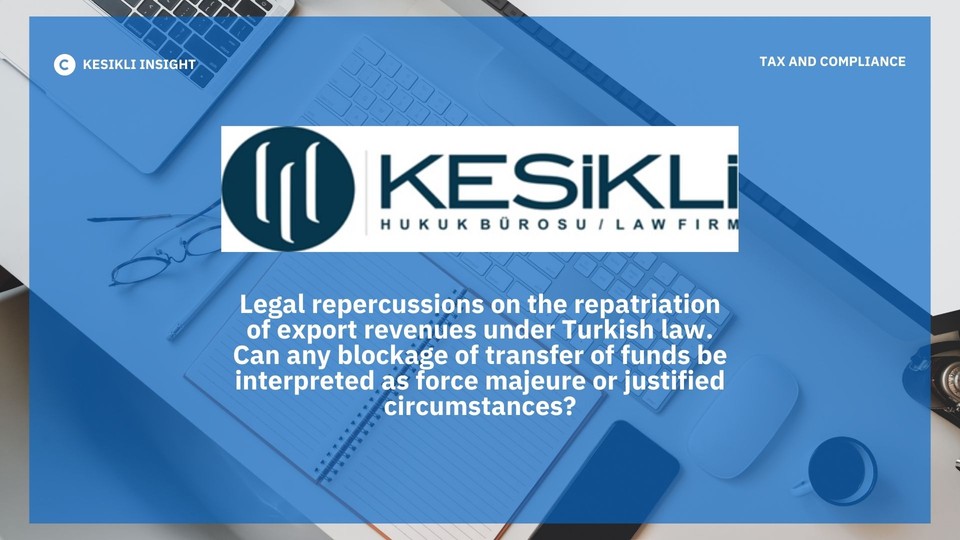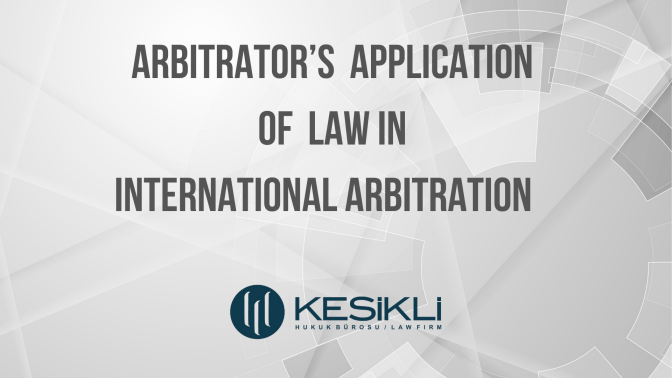I. INTRODUCTION
As there is not an exact definition of a violation of public order under the legislation, Supreme Court precedents regarding violation of public order provide guidance on this matter.
In an earlier decision of the Constitutional Court, it was pointed out that public order represents everything that aims to ensure the peace and tranquillity of the society and the preservation of the State and the State organization, and in other words, it covers the rules that form the basis of the order of the society in every field (1).
The Court of Cassation General Assembly of Civil Chambers (Yargıtay Hukuk Genel Kurulu) defines the events that are contrary to the public order as “The events that seriously shake the rules of morality and honesty, the basic principles and value judgments of society, the law, the justice, the understanding of morality, the fundamental rights in the Constitution constitute a violation of the public order”, and (2)The 9th Civil Chamber of the Court of Cassation defines such cases as “A foreign legal rule is based on the basic values of Turkish law, Turkish general understanding of morality and decency, the basic understanding of justice and legal policy on which Turkish laws are based, fundamental rights and morals in the Constitution. freedoms, common and accepted principles of law in the international arena, bilateral agreements, the understanding of morality and justice adopted by developed societies, the level of civilization, and the political and economic regime, it may be contrary to our public order.” [Decision of the General Assembly on the Unification of Judgments (Yargıtay İçtihadı Birleştirme Genel Kurulu), Case No. 2010/1 Decision No. 2012/1 T. 10.02.2012]. For instance, allowing minors to work or racial discrimination in terms of salaries and other rights which can be legal in foreign states are against public order (3)*.
Academic scholars use the expressions of "all of the institutions and rules that ensure good public services in a country, the safety and security of the state, and compliance with the peace and moral rules in the relations between individuals" and "rules that protect the basic structure and interests of the society" (4) while defining the rules which should be tested in deciding on violation of public order.
In this article, the concept of violation of international public order will be examined from Turkish Law and comparative law aspects, with an emphasis on its impact on the enforcement of foreign judgments and arbitral awards.
II. VIOLATION OF PUBLIC ORDER IN TURKISH PRIVATE INTERNATIONAL LAW
The concept of public order in International Private Law should be interpreted and understood in a narrower manner compared with the domestic public order. Mandatory rules of law or public order rules of a country should not always be considered as a part of international public order.(5)
As a matter of fact, the judgment of the General Assembly on the Unification of Judgments (Yargıtay İçtihadı Birleştirme Genel Kurulu) (Case No. 2010/1, Decision No: 2012/1) dated 10.02.2012 also held that "Here, the only possibility to ensure the refusal of the foreign judgment is that the foreign judgment or parts of the judgment should be clearly contrary to the Turkish public order." It has been stated that in a possible examination of the public order in terms of the conditions of enforcement, the main issue to be considered is the judgment part without going into the merits of the case (which is known as revision au fond).
Due to the necessity for the existence of a clear violation of public order in the Foreign Judgement, abstract public order claims should not be admitted as a violation of public order as also defended by SANLI expressly stating “Whether the decision subject to enforcement is against public order will be determined by an evaluation to be made on a provision in the Judgment. In order to point out this issue, in subparagraph c of Article 54, only ‘the provision should not be clearly contrary to public order’ is required in order to issue an enforcement decision.” (6).
In the same vein, the necessity for a serious, tangible, clear, and intolerable violation of public order is required to qualify a judgment as contrary to the public order, as defended by NOMER stating: “… the only possibility to obtain a refusal is that the foreign court's ‘judgment’ should be clearly contrary to the Turkish public order” (7). Another scholar EKSI expresses a similar approach stating: “in order to reject the recognition request due to violation of public order in accordance with Article 54 of the International Private Law and Procedural Law No. 5718,, it is not sufficient for the violation to be against the Turkish public order, but for the violation to be "clearly" against the Turkish public order, in other words, whether the recognition causes an intolerable situation in terms of Turkish Law.” (8).
i. Violation of Public Order in terms of MÖHUK Article 5
Within the framework of Law No. 5718 on International Private and Procedural Law (“MOHUK”), violation of public order takes place in 3 different articles. The first of these articles is MOHUK art. 5, the provision in which it is regulated that the foreign laws shall not be applied in the event of contradiction with the Turkish public order as follows: “In the case that the provision of the competent foreign law applicable to a particular case clearly contradicts with the Turkish public order, this provision shall not be applied; where deemed necessary, Turkish law is to be applied.” Thus, it is indicated that the laws to be applied to the merits of the dispute shall not be applied if such laws constitute a breach of public order. The violation of public order should be evaluated according to the merits of each case, and the consequence of applying the foreign law shall constitute a breach of public order.
This matter was also addressed in the decision of the 15th Civil Chamber of the Court of Cassation (Yargıtay 15. Hukuk Dairesi) (Case No. 2021/2087, Decision No. 2021/698) dated 9.3.2021;
“In Article 5 of the MOHUK, it is stated that the competent foreign law shall not be applied if the provision applied to a particular event is clearly contrary to the Turkish public order. In the article, we can say that by seeking a clear violation of public order, the lawmakers aim to interpret the violation of public order narrowly in this regard. If the result of applying the foreign law to a certain case creates an intolerable situation in terms of the elements related to the content of the public order, it is considered that the foreign law clearly violates the public order and foreign law shall not apply” (Şanlı, Cemal; Milletlerarası Özel Hukuk, V. Kitapçılık, Istanbul 2014, p. 74)”
There are different opinions across academic scholars regarding the methods to be followed in cases of violation of public order within the scope of international private law. An opinion defends the application of public order rules directly to the dispute. As per this opinion, for instance, marriage barriers in the Turkish Civil Code, such as the mental capacity, mental illness, and situation where one of the spouses is currently married at the time of marriage, should definitely be required in cases of disputes involving foreign elements. In other words, these issues are accepted to be of public order and Turkish Law is proposed to be applied instead of foreign law in such cases (9)
According to the second and more common view, violation of public order is an exception. The main rule is the application of the law indicated in the conflict of laws rules to the dispute, however, if this situation is lead to a result clearly contrary to public order, the judge has an exceptional authority not to apply this rule.
ii. Violation of Public Order in Terms of MOHUK art. 54
Another regulation for violation of public order is regulated in MOHUK 54/1/c as an enforcement obstacle.
MOHUK Article 54:
“The competent court shall render enforcement subject to the following conditions:
a) Existence of an agreement, on a reciprocal basis between the Republic of Turkey and the state where the Judgment is given or a de facto practice or a provision of law enabling authorization of the execution of final decisions given by a Turkish court in that state,
b) The judgment must have been given on matters not falling within the exclusive jurisdiction of the Turkish courts or, in the case of being contested by the defendant, the judgment must not have been given by a state court which has accepted himself competent even if there is not a real relation between the court and the subject or the parties of the lawsuit,
c) The judgment should not be clearly contrary to public order,
ç) The person against whom enforcement is requested was not duly summoned pursuant to the laws of that foreign state or to the court that has given the judgment or was not represented before that court, or the court decree was not pronounced in his/her absence or by a default judgment in a manner contrary to these laws, and the person has not objected to the exequatur based on the foregoing grounds before the Turkish court.
Not being clearly contrary to public order is listed as one of the conditions of enforcement under MÖHUK article 54/c and accordingly, it is necessary to analyse whether the consequences that may occur in the event of enforcement of a foreign judgment in Turkey violate the Turkish public order, not the law applied in rendering the foreign judgment and the criteria applied accordingly. It shall be understood from the expression "the judgment is not clearly contrary to the public order" in the aforementioned article that the law applied to the merits of the foreign judgment will not be examined in terms of being contrary to the Turkish public order, and the application for the enforcement of the foreign judgment will only be rejected if the legal consequences resulting from the enforcement of the judgment are contrary to the public order. The application for enforcement of the foreign judgment cannot be rejected due to mere reasons such as the differences between the law applied to the merits of the case and Turkish Law or that it is contrary to the mandatory rules of Turkish Law. (10)
In fact, it is the dominant opinion amongst academics that the question as to whether the foreign law applied in obtaining the foreign judgment is contrary to Turkish public order or not, should not be examined. Accordingly, the judge that is to decide on the enforcement judgment does not have the authority to examine the foreign law that is applied by the foreign judge or the method used for applying such foreign law, but the judge shall only investigate whether conditions required for recognition and enforcement under Turkish law exist. Although the law applied to the foreign judgment is not contrary to public order, it is possible that the execution of the relevant judgment in Turkey may have consequences contrary to the public order. (11)
Court of Cassation General Assembly on the Unification of Judgments (Yargıtay İçtihadı Birleştirme Genel Kurulu) (Case No:2021/1, Decision No: 2021/K) dated 10.02.2012 resolved the inconsistency between the opinions of the 2nd Civil Chamber of the Court of Cassation (Yargıtay 2. Hukuk Dairesi) with the same Chamber and the 13th Civil Chamber of the Court of Cassation (Yargıtay 13. Hukuk Dairesi) on whether the foreign judgments without reasoning are contrary to public order and in this context, whether the lack of reasoning is to constitute an obstacle in the enforcement of the foreign court decision. In this decision, it was held that as public order is a difficult concept that may change according to the time and place as of its nature subject to circumstances of each case, it is difficult to determine its content; it is not possible to indicate that the situations that are to necessitate the violation of the Turkish public order are mostly be considered as a clear violation of a mandatory provision, but provision contradicting with the Turkish public order does not automatically occur in the event of a violation of every mandatory provision or every foreign decision that violates a mandatory law. As per the same decision, in order for a foreign court decision to be enforced according to Article 54/c of the MÖHUK, it is essential that this court decision does not contain a “provision” that may require intervention of the Turkish public order, however, it was also stated that the only possibility for the refusal of the enforcement of the court decision is the existence of a clear contradiction of foreign court's "judgment or its provisions" with the Turkish public order. In summary, it is stipulated that the "reasoning" in the foreign decision will not prevent enforcement of the judgment and is not a criterion in determining whether there is a breach of public order.
iii. Violation of Public Order in terms of MÖHUK art. 62
Finally, the issue of violation of public order is regulated in Article 62/1/b of the MÖHUK as a condition that will prevent the enforcement of foreign arbitral awards.
MÖHUK Article 62:
(1) The court shall dismiss the enforcement request of a foreign arbitral award, if,
a) An arbitration agreement is not executed or arbitration clause does not exist in the main agreement,
b) The arbitral award is contrary to public morality or public order,
c) It is not possible to settle the dispute subject to the arbitral award by way of arbitration under Turkish law,
ç) One of the parties has not been duly represented before the arbitrators and has not expressly accepted the acts concluded thereafter,
d) The party against whom the enforcement of the arbitral award is requested has not been duly notified of the appointment of arbitrators or has been deprived of his/her right to make claim and defense,
e) The arbitration agreement or clause is invalid pursuant to the governing law designated by the parties, or in the absence thereof, pursuant to the law of the place where the arbitral award is rendered,
f) The appointment of the arbitrators or the procedure applied by the arbitrators violates the agreement of the parties, or in the absence thereof, the law of state where the arbitral award is rendered,
g) The arbitral award has been rendered on an issue that is not included in the arbitration agreement or arbitration clause or exceeds the limits of the agreement or the clause (only the exceeding part),
h) The arbitral award is not final, enforceable, or binding under the governing law or the governing procedure or the law of state where it was rendered or it is annulled by the competent authority in the place where the award is rendered.
The main source of law applied in international arbitration is the New York Convention. Under the 1st Article of the Convention, the scope of application is specified as, “the recognition and enforcement of arbitral awards made in the territory of a State other than the State where the recognition and enforcement of such awards are sought, and arising out of differences between persons, whether physical or legal.” However, if a foreign arbitral award does not fall within the scope of this convention, the provisions of MOHUK are applied. Under Article 62 of MOHUK mentioned above, the situations that constitute obstacles in the enforcement of foreign arbitral awards are listed and one of them is a violation of public order. In this vein, it can be stated that the enforcement barriers specified in the New York Convention and those stipulated in the MÖHUK are in parallel with each other. Eventually, regardless of the regulation to be applied, the enforcement of foreign arbitral decisions that will result in contradiction to public order will not be admissible.
III. THE CONCEPT OF VIOLATION PUBLIC ORDER IN COMPARATIVE LAW
Public order is a difficult concept to define in comparative laws as well as in Turkish Law. Considering the difficulty of drawing the framework of public order, the exceptional cases in international private law have been largely left to interpretation.
The Courts of England defined public order in one of its judgments as follows: “Since every law is an expression of the public policy of the state, some higher threshold is needed to prevent the forum’s law from being applied in every case. A strict construction of the public policy exception [is] necessary to prevent the whole field of conflicts of law from collapsing in on itself” (12)
Under the European Union Law, public order is handled within the framework of the superiority of law and the rights and freedoms determined in the European Convention on Human Rights. Under the Convention, which is the essential regulation on this subject, these principles are adopted and public order is guaranteed.
The European Court of Justice, while evaluating a case, stated that public order is “an ambiguous legal concept”. The court; decided that public order should be accepted as "a general provision that should be filled with values", and drew attention to the necessity of "compliance with the standard of fundamental rights and freedoms" on which the legal meaning and importance of public order is based. (13)
In the Murlidhar Agarwal & Anr. v.State of U.P. & Ors.case, the Indian Supreme Court noted that public policy did not remain static in any given community and that it can change from generation to generation, and even within the same generation and that public policy would be almost useless if it were to remain in fixed moulds for all times. It is intended to protect a weaker section of the community with a view to ultimately protecting the interests of the community in general by creating equality of bargaining power.
In the case of Renusagar Power Co. Ltd. v. General Electric Co., the Indian Supreme Court approached the concept of public policy in detail and stated that the execution of a foreign decision would be rejected on the grounds that it is contrary to public policy if it is contrary to the fundamental policy of Indian Law, its interests, or it is contrary to justice and morality.
IV. CONCLUSION
The concept of international public order is critical, especially while enforcing foreign judgments or arbitral awards. If a foreign judgment or foreign arbitral is found to be contrary to the international public order, such finding would have very serious consequences such as unenforceability. Given such importance, the concept of violation of international public order needs to be interpreted and understood in a much narrower manner, and with due regard to the general principle of prohibition of revision de fond.
(1) Republic of Turkey Supreme Court, Case No: 63/128, Decision No: 64/8, Date: 28.01.1964.
(2) Court of Cassation General Assembly of Civil Chambers, Case No: 1998/12-287, Decision No: 1998/325, Date: 06.05.1998
(3) Court of Cassation 9th Civil Chamber, Case No: 2020/5616, Decision No: 2020/16555, Date: 24.11.2020
(4) Çelikel & Erdem, Milletlerarası Özel Hukuk İstanbul, 2020, 16th Edition p. 149.
(5) Prof.Dr. Aysel Çelikel, Prof Dr. Bahadır Erdem, Milletlerarası Özel Hukuk, 12th Edition, p.149
(6) Prof. Dr. Cemal ŞANLI, Milletlerarası Özel Hukuk, 2015 dated 4th Edition, p. 515, para. 230
(7) Prof. Dr. Ergin NOMER, Milletlerarası Usul Hukuku, 2009 dated, 1st Edition, p.166
(8) Prof. Dr. Nuray Ekşi, Yabancı Mahkeme Kararlarının Tanınması ve Tenfizi, 2013 dated, 1st Edition, p.301
(9) SAYMAN, Y., Devletler Hususi Hukukunda Evlenmenin Kuruluşu p. 39, İstanbul, 1982
(10) Court of Cassation General Assembly of Civil Chambers, Case No: 2017/18-1924, Decision No: 2019/1060, Date: 15.10.2019
(11) Prof.Dr. Aysel ÇELİKEL, Doç.Dr. B. Bahadır ERDEM, Milletlerarası Özel Hukuk, 10. Edition, p.612, 613
(12) Tucker v RA Hanson Co (1992) 956 F 2d 215 at 218.
(13) Judgment of the Bundesverwaltungsgericht of 24 Oktober 2001
@Ömer Kesikli
Let's Get Connected!



